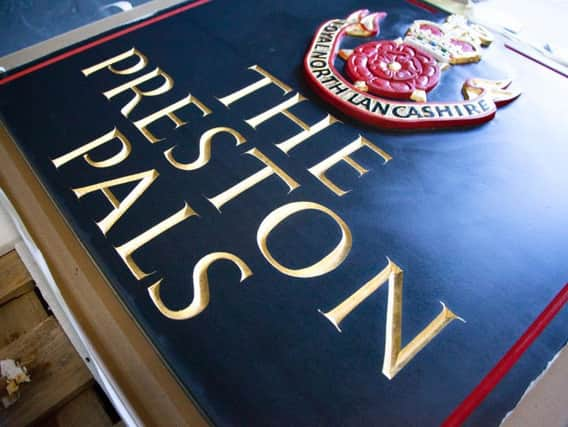'˜Ordinary trench warfare is child's play to this offensive'


One of the members of the original Preston Pals Company, who was a member of the Daily Post reporting staff when he enlisted, gives us an interesting account of his adventures during the ‘big push’ in a long letter to his mother.Writing from ‘a quiet village miles behind the firing line,’ he says:“We came out of action on Monday, July 31 after being in the thick of it all month: a month I shall never forget.“In my section (machine guns) we have a lot of extra tackle which we move about with special handcarts.“These carts are all right on good roads, but you can picture us shoving them around on the ground captured from the Germans, some three or four miles in depth, which is one mass of shell-holes and debris, and through a perfect maze if motor lurries and all sorts of traffic.“The position we had to occupy was a newly captured trench in front of the village which was the scene of our last scrap. The German gunners started bombarding when we neared the position, and we had a pretty hot time.“They kept it up all night, but slackened off next morning. Both sides were shelling everlastingly, and the din never ceased. It is not exactly pleasant sitting tight and wondering where the next shell is going to drop. “The following afternoon we helped to bring down a German aeroplane. Two of our aeroplanes were chasing it, and it flew pretty low near our trench, trying to dodge them and get back to its own lines.“We let fly at it with rifles and machine guns and suddenly it tilted sideways, burst into flames, and fell with a crash just in front of our trench. The sky is always swarming with aeroplanes, but we see very few German aircraft.“The following night we advanced, under the cover of darkness, to a new trench in front of our position. “The Germans did not know exactly where we were, and we were not sure of their position. Consequently both sides had scouting parties out, and things were rather exciting. “The new trench was quite isolated, and the German snipers got one or tow of us in the open ground to the rear, so it was not an easy matter to get food and water up to the men.“I tried to keep my thirst down by chewing rubber, but I would have given 20 francs gladly for a pint of water.“The charge did not come off till the following Sunday morning, just after midnight. We intended to surprise the Huns in the dark, but they were ready for us, and met us with machine-gun fire and bombs.“Our casualties were rather heavy, but I was one of the lucky ones. A few of us got a footing in the German trench, but not enough to hold it.“Most of the wounded were able to get back, but a few were forced to lie out in shell holes. We crawled out and dragged some of them in, but the dirty Germans sniped the rescuers.“That afternoon we were relieved, and we occupied a line of support trenches in a wood a little behind the trench we had just left.“For two days we had a fairly quiet time, and then the Germans began systematically searching every inch of the wood with shells of all sorts and sizes, including gas and tear shells.“Our own shelling was terrific; at least ten times as heavy as theirs; one continuous roar.“Naturally we had some casualties and all of us had narrow shaves. It would take book to describe all I saw and heard during that month, on every day of which the weather was extremely hot.“Every tree in that wood was splintered and scarred with shell fire, and the ground was one mass of shell holes.“It was curious to watch the effect of the bursting shells . A valley to the right traversed by two roads got it pretty hot. You could see a wagon or gun team galloping along, with shells dropping all around them.“The one would burst right over them, but the team would unharness a wounded horse or two - like lightning - shoot them, and gallop on.“We came out of the battle area dead beat and dirty, and after a late dinner behind the lines, were taken in motor lurries to a village several miles back. Ordinary trench warfare is child’s play to this offensive.“An old soldier in our battalion who has been through most of the big engagements says they were nothing compared to this, and our French comrades say Verdun is a minor affair in comparison.”